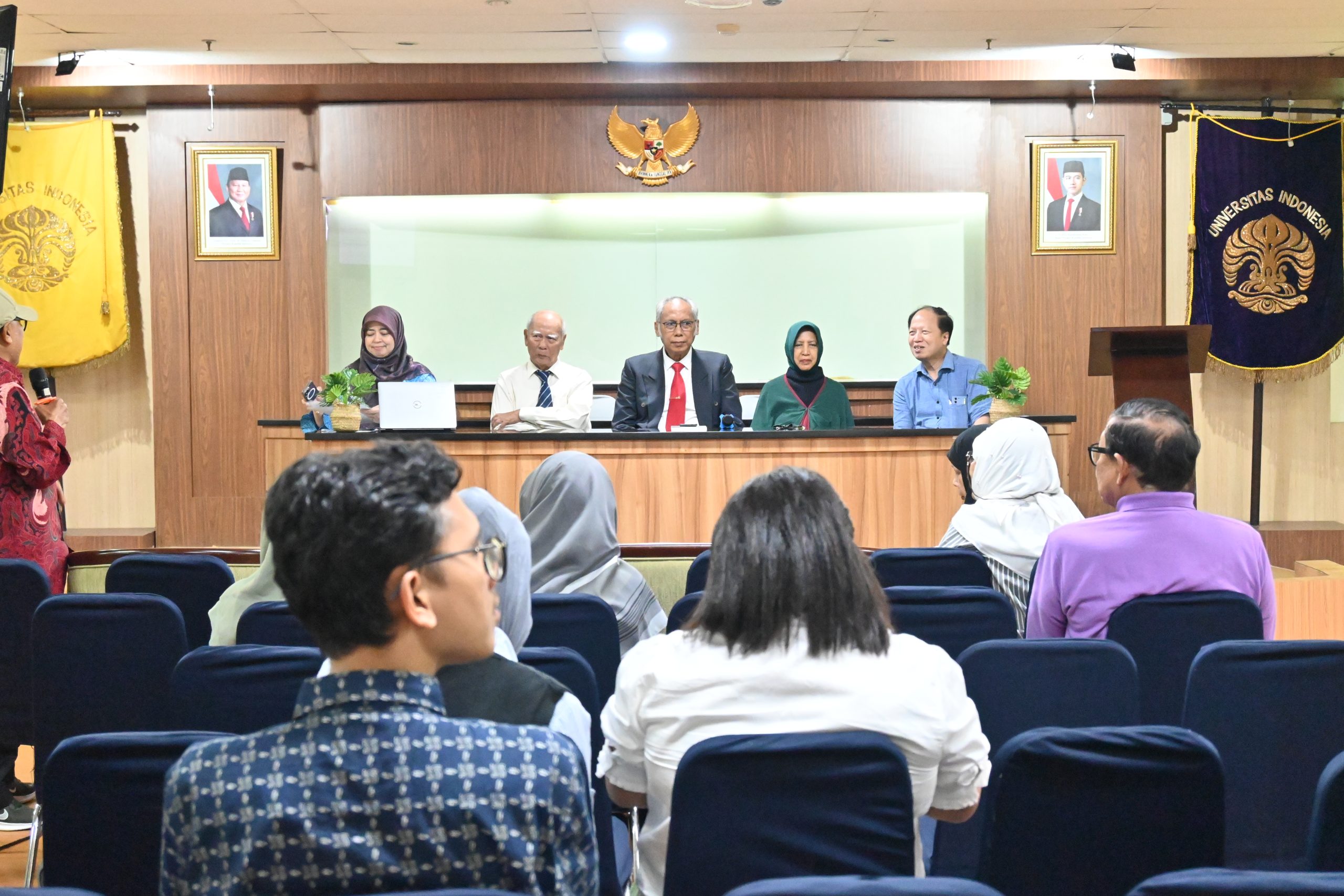The Faculty of Public Health, Universitas Indonesia (FPH UI), held the fourth installment of its Online Seminar Series (Semol Series 4) on Saturday, May 24, 2025, with the theme “Elderly Health: Perspectives from Public Health and Clinical Experts.” The hybrid event took place in the Doctoral Promotion Room at FPH UI and via Zoom, featuring prominent clinical and public health experts.
The seminar was opened by the Vice Dean for Resources, Ventures, and General Administration at FPH UI, Dr. Milla Herdayati, S.K.M., M.Si., who emphasized the importance of a holistic approach in addressing the aging population phenomenon and highlighted the need for interdisciplinary collaboration to achieve healthy and productive ageing.
This seminar was a collaborative effort between the Reproductive Health Study Group of FPH UI and alumni from the Faculty of Medicine, Universitas Indonesia (FKUI) Class of 1975. Prof. Dr. dr. Sabarinah, M.Sc., Chair of the Reproductive Health Study Group at FPH UI, stated that this meeting symbolizes five decades of friendship and is expected to generate tangible outcomes in comprehensive elderly health management. Dr. dr. Bambang Trijaya, Sp., MMP., representing the FKUI alumni class of 1975–1981, also noted that in addition to the demographic bonus, Indonesia faces an “age bonus” that can be a tremendous asset if properly managed.
The first session was delivered by Prof. Dr. dr. Bambang Budi Siswanto, Sp.JP(K), FISHR, FAsCC, FAPSC, Professor of Cardiology and Vascular Medicine at FKUI. He stressed the importance of preventing heart disease in the elderly through gradual risk factor management, noting that coronary heart disease can be attributed to five modifiable risk factors: cholesterol, hypertension, diabetes, obesity, and smoking. Early detection via coronary risk screening was presented as a key strategy. He further recommended maintaining ideal body weight, consuming a heart-healthy diet, managing stress, quitting smoking, controlling blood pressure and cholesterol, limiting alcohol intake, maintaining proper sleep, managing diabetes, and adhering to prescribed medications.
Dr. dr. Bimanesh Sutarjo, Sp.PD, KGH, FINASIM, FACN, an internal medicine specialist, presented “Understanding Chronic Kidney Disease: Prevention and Management.” He highlighted the increasing burden of Chronic Kidney Disease (CKD) in older adults and emphasized healthy lifestyles to mitigate the economic and social impact. Citing 2024 Riskesdas data, he noted a CKD prevalence of 0.6% among those aged 75 and older. He explained that age-related kidney function decline—such as reduced nephrons, glomerular filtration rate, and blood flow—can significantly impact elderly health. Preventive actions include eating more vegetables and reducing salt and alcohol intake.
Prof. Dr. dr. Budi Iman Santoso, SpOG, Subsp Urogin RE, MPH., a Urogynecology Expert, addressed “Stay Comfortable, Stay Confident: Maintaining Intimate Health in Old Age.” He advocated for better awareness and care of elderly intimate health to improve quality of life. He pointed out that often-overlooked issues such as urinary incontinence, discomfort during urination, uterine prolapse, and urinary retention are common and preventable. “Aging should not mean declining life quality. Our bodies have served us for decades; now it’s time we care for them with love,” he reminded.
The fourth topic, “Prevention and Management of Dementia,” was presented by Dr. Wanarani Alwin Mufti, SpKFR(K), Head of the Geriatrics Division at the Department of Physical Medicine and Rehabilitation, RSCM. She emphasized the need for an active lifestyle and cognitive engagement to prevent dementia—a syndrome characterized by the decline of cognitive function beyond what is expected from normal aging. Symptoms include both cognitive and psychological disturbances.
Finally, Prof. Dr. dr. Sudijanto Kamso, S.K.M., Professor in the Department of Biostatistics and Population at FPH UI, addressed the urgency of preparing a healthcare workforce for the elderly and introduced the Master’s Program in Public Health with a concentration in Geriatric Health. He emphasized the concept of “successful aging,” which includes maintaining physical and mental health, cognition, productivity, social engagement, and financial stability. Despite this ideal, Indonesia still needs to increase the number of geriatric healthcare professionals and align strategies with national workforce planning.
Through this interdisciplinary discussion, FPH UI reaffirms the academic community’s vital role in addressing the challenges of elderly health and strengthens the synergy between education and practice to build a healthy, independent, and meaningful aging ecosystem. (ITM)

